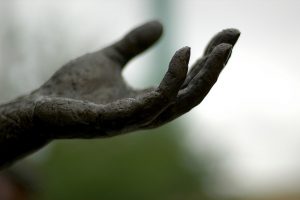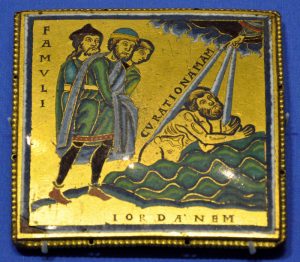Revised Common Lectionary Reflection, Proper 23 (28), Eighteenth Sunday after Pentecost, Year C
October 13, 2019
Lessons: 2 Kings 5:1-3, 7-15c; Psalm 111; 2 Timothy 2:8-15; Luke 17:11-19
Theme: God’s faithful and generous people receive what they need when they open their hands, hearts, and minds and turn their full attention and very life to God.
Key Scripture: Then [Jesus] said to him, “Get up and go on your way; your faith has made you well.”
 This week’s Lectionary lessons provide two healing stories and plenty to ponder. Both healings involve insiders and outsiders, Jews and foreigners (enemies even!). Both stories contain surprise elements. Both stories could be heard and dismissed out of hand without fully considering the contexts’ implications of such radical healing.
This week’s Lectionary lessons provide two healing stories and plenty to ponder. Both healings involve insiders and outsiders, Jews and foreigners (enemies even!). Both stories contain surprise elements. Both stories could be heard and dismissed out of hand without fully considering the contexts’ implications of such radical healing.
In her book Radical Remission, author Kelly Turner cites nine key factors in the healing of more than 1,000 people diagnosed with serious or terminal cancer. Her research and work in the field of integrative oncology led her to question why some people not only survive but actually thrive. Turner identified 75 factors that appeared consistently throughout the cases studied, but every person in her study included these nine “key factors” in their regimen of healing:
- Radically changing their diet
- Taking control of their own health
- Following their intuition
- Using herbs and supplements
- Releasing suppressed emotions
- Increasing positive emotions
- Embracing social support
- Deepening their spiritual connection, and
- Articulating strong reasons for living.
Some individuals in the study combined allopathic (traditional western) medicine with complementary therapies, while others were given no hope and told there was nothing else to be done but go home and put their affairs in order. There are, in short, no cookie cutter approaches to healing.
While the art and science of medicine have made tremendous advances in the last century, there is still a lot we do not know or understand about how the body heals, or why some people respond better to treatment than others. Even terms such as cure, heal, remission, and wellness are understood—or misunderstood—in many different ways. Most of the world still operates under what Turner calls the “Newtonian mind-set of medicine” where doctors are basically mechanics trained to fix the body/machine when it has a problem and breaks down.
The two healing stories this week both result in healed bodies, but there is so much more. In the process of healing Naaman of his skin disease, the proud foreign warrior also encounters God and learns that what he thought his healing should look like and what it did look like are two very different things. Instead of prescribing fancy treatment and personal hands-on healing, the prophet Elisha sends a messenger to tell Naaman to wash seven times in the Jordan River. Naaman is at first resistant to the instructions, but his servants persuade him to follow Elisha’s simple instructions. His skin is restored. But importantly, his eyes and mind and heart are opened.
In the passage from Luke’s gospel, Jesus encounters 10 lepers who plead for him to have mercy on them. Again, simple instructions are offered: “Go and show yourselves to the priests.” No fancy, expensive, or painful protocol is needed for all 10 to be restored to wellness. However, only the one foreigner in the group disobeys Jesus’ instructions and comes back to bow before him and offer praise and thanksgiving to God. Jesus tells him “Get up and go on your way; your faith has made you well.”
 What do these healing stories mean to us today? We know that not all people were made well during Jesus’ ministry, and we know that not everyone today will be cured or healed. Death is part of life; we all have an expiration date for our current “packaging.” Perhaps the hope we find here is a reassurance that God is completely interested in our well-being. Jesus wants us to be healed, to be made well in body, mind, and spirit. We find hints in these stories that encourage us to listen, to pay attention, to be grateful, and to trust that Jesus is restoring us to wholeness not just here on earth but for eternity.
What do these healing stories mean to us today? We know that not all people were made well during Jesus’ ministry, and we know that not everyone today will be cured or healed. Death is part of life; we all have an expiration date for our current “packaging.” Perhaps the hope we find here is a reassurance that God is completely interested in our well-being. Jesus wants us to be healed, to be made well in body, mind, and spirit. We find hints in these stories that encourage us to listen, to pay attention, to be grateful, and to trust that Jesus is restoring us to wholeness not just here on earth but for eternity.
Our healing may not match our expectations; for example, there may be no cure for a physical condition, but we can still draw closer to God and find healing from past emotional and spiritual wounds. Some may experience their physical maladies as cured but still need to do deep work to heal heart wounds and dis-ease. The good news is that we are all being “made well” by our faith in Christ. It’s a process, yes, but it’s one that we can count on and have faith in. Given this good news, our charge is to rejoice, to offer our praise and thanksgiving, and live each precious moment as we savor the goodness of God’s abundance. To your healing and being made well!
In Worship
Make sure to have an opportunity for healing prayer and anointing with oil, either as part of your worship service or in a brief separate service following your regular worship time. Invite worshipers into healing practices such as breathing exercises, simple “pew” yoga, meditative prayer, etc. If you have someone in your congregation who is a integrative wellness practitioner, yoga instructor, spiritual director, nutritionist, massage therapist, physician, and/or chiropractor, consider having them speak about their vocation in the healing arts and why healing of mind, body, and spirit is so important.
With Youth
Invite youth to consider the two healing stories in today’s Lectionary (2 Kings 5:1-3, 7-15c and Luke 17:11-19). Who are the lepers of today calling out for Jesus’ mercy and who are sometimes shunned in our culture? What do you notice about expectation for healing versus the reality of the healing? Why does an attitude of gratitude matter? What does Jesus mean when he says to the grateful leper, “Get up and go on your way; your faith has made you well.”? Is there a difference between our understanding of cure and healing? If so, what is that difference and why does it matter? Why does tending to mind, body, and spirit matter when we consider our own individual wellness and health?
With Children
This week’s focus verse is 2 Kings 5:14– So Naaman went down and immersed himself seven times in the Jordan, according to the word of the man of God; his flesh was restored like the flesh of a young boy, and he was clean.
You will need a mason jar filled with water (preferably from a creek or river) and a bag full of vitamins, maybe some over the counter medications, and a magic wand toy.
Ask the children what they would do if they woke up with a fever, sore throat, and runny nose. Entertain their answers. Then tell them what you would do and pull from your bag some cough syrup, throat lozenges, Tylenol, a thermometer, etc. You might try to treat yourself first, right? But if you get worse, you go to the doctor. Naaman had no luck treating his skin condition, until a slave girl in his home suggested he see Elisha the prophet in Israel. Naaman is willing to try anything, so he goes to Elisha’s house only to be told by a messenger to go wash in the Jordan River seven times. Naaman was expecting more—maybe some magic healing (pull out the wand and wave it), so he was upset. How could water from a dirty river be healing, he wondered. (Show the mason jar with water.) His servants convinced him to follow the prophet’s instructions, and sure enough he was healed. The lesson for us is that sometimes God uses unusual tools, people, and situations to help us be well, to heal us—both our bodies and our hearts. Yes, we want to use all the good knowledge and skills of medicine, but we don’t want to overlook other tools God uses for healing: chicken soup, a warm blanket, plenty of water (preferably cleaner than this!), and quiet rest. Finish with a simple prayer, inviting children to pray for those in their lives who need healing.
Weekly Stewardship Bulletin Insert
This week we learn about the stewardship of our well-being through two healing stories. Healing and wellness may not appear just how we imagine, but we can have complete faith that God desires us to be well—both here and in eternity.
Stewardship at Home
This week take some time and make a list of homebound members or to friends and family who need encouragement or who are ill or recovering from illness. As you are able, send cards, notes, hot soup, flowers, and other small kindnesses as signs of healing and hope. Make sure to spend extra time in prayer for those on your healing prayer list, and give thanks to God for the gift of wellness and healing.
2016 Reflection: https://www.stewardshipoflife.org/2016/10/the-gratitude-attitude-2/
2013 Reflection: https://www.stewardshipoflife.org/2013/10/first-and-always-give-thanks/
2010 Reflection: https://www.stewardshipoflife.org/2010/10/wellness-and-a-broken-sea-shell/
Images: Dmitry Kichenko; Jeff Kubina; and Naaman is cured from leprosy, from Art in the Christian Tradition, a project of the Vanderbilt Divinity Library, Nashville, TN, Creative Commons usage license. Thanks!
Note: Reprint rights granted to congregations and other church organizations for local, nonprofit use. Just include this note: “Copyright (c) 2019, Rev. Sharron Blezard. Used by Permission.” Other uses, please inquire: thewritelife@hotmail.com.




Leave a Reply